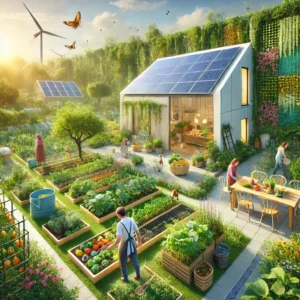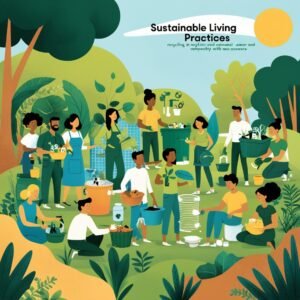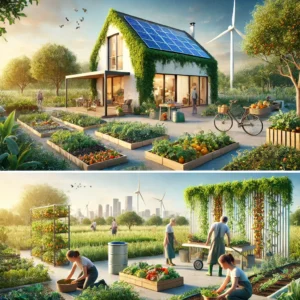Sustainable Living Practices
Sustainable Living Practices: Simple Steps for a Greener Future
Sustainable living is all about making conscious choices to reduce your impact on the environment. It’s not just about saving resources but also creating a healthier planet for future generations. The good news? Small changes in your daily life can add up to a big difference. Here’s a guide to practical and easy steps you can take to live more sustainably.
1. Embrace the Three R’s: Reduce, Reuse, Recycle
The three R’s are the foundation of sustainability: reduce, reuse, and recycle. Start by cutting down on what you consume. Do you really need all that packaging? Opt for products with less waste or choose bulk options. Next, get creative with reusing things you already have. Glass jars can become storage containers, and old clothes can turn into cleaning rags. Finally, recycling ensures materials like paper, metal, and plastic stay out of landfills and are repurposed into something new.
Easy Ways to Get Started:
- Always carry reusable bags, water bottles, and coffee cups.
- Repurpose old household items instead of throwing them out.
- Follow your local recycling rules to make sure you’re doing it right.
2. Save Energy at Home
Reducing energy consumption is one of the most effective ways to live sustainably. Simple steps like turning off unused lights, unplugging electronics, and switching to LED bulbs can make a huge difference. Want to go further? Renewable energy options, like solar panels, are becoming more accessible. Even small changes, like adjusting your thermostat or air-drying your clothes, can help cut energy use and lower your bills.
Quick Energy-Saving Tips:
- Use natural sunlight during the day instead of artificial lights.
- Upgrade to energy-efficient appliances whenever possible.
- Seal gaps in windows and doors to maintain indoor temperatures.
3. Choose Greener Transportation
Transportation contributes significantly to carbon emissions, but there are greener options to consider. For short trips, walking or cycling not only reduces pollution but also improves your health. Public transportation is another great way to lower your carbon footprint. If driving is necessary, carpooling or investing in electric or hybrid vehicles can help reduce your environmental impact.
Sustainable Travel Ideas:
- Walk or bike for short errands instead of driving.
- Use public transport to cut down on individual car use.
- Explore electric or hybrid cars for a cleaner ride.
4. Eat More Mindfully
What you eat matters for sustainability. Shifting toward plant-based meals, even just a few times a week, significantly reduces your environmental impact. Animal farming consumes large amounts of water and energy while contributing to greenhouse gases. Choose local, seasonal produce to reduce food miles and support farmers in your area. To further reduce waste, plan meals ahead and compost leftovers to close the loop.
Tips for Sustainable Eating:
- Add more vegetables, grains, and legumes to your diet.
- Buy local and seasonal produce whenever you can.
- Compost food scraps instead of throwing them in the trash.
5. Conserve Water
Water is precious, and every drop counts. Simple habits like turning off the tap while brushing your teeth, fixing leaks quickly, and using water-saving devices can drastically reduce your water usage. You can also collect rainwater for your garden or cleaning tasks. For landscaping, opt for drought-resistant plants that need less watering.
Water-Saving Habits:
- Install water-saving showerheads and faucets.
- Use rainwater for gardening and outdoor cleaning.
- Fix leaks as soon as you notice them.
6. Switch to Eco-Friendly Products
Many household products contribute to pollution, but there are greener alternatives. Choose biodegradable, natural, or reusable products whenever possible. For example, swap out plastic toothbrushes for bamboo ones or use natural cleaning agents. Supporting companies that prioritize sustainability sends a message that eco-friendly practices matter.
Easy Eco-Friendly Swaps:
- Use reusable cloth bags instead of single-use plastics.
- Switch to natural personal care products free from harmful chemicals.
- Choose biodegradable household items for less waste.
7. Simplify with Minimalism
Minimalism is about focusing on what truly adds value to your life. By buying less and choosing quality over quantity, you reduce waste and environmental strain. Instead of cluttering your home with unnecessary items, invest in durable products that last. If you no longer need something, donate it to someone who does.
Minimalist Living Tips:
- Buy only what you need and choose high-quality, long-lasting items.
- Donate or sell unused belongings to reduce clutter and waste.
- Avoid impulse purchases by thinking twice before buying.
8. Support Sustainable Brands
The brands you support play a role in shaping the future. Look for companies committed to ethical and sustainable practices, like using renewable materials, reducing waste, and treating workers fairly. Certifications like Fair Trade, Organic, or Rainforest Alliance can help you identify eco-friendly options.
How to Choose Sustainable Brands:
- Research brands before you buy to learn about their values.
- Support local businesses that prioritize eco-friendly production.
- Look for products with minimal packaging or sustainable materials.
9. Start a Green Garden
Gardening is a rewarding way to contribute to the environment. Growing native plants supports local wildlife and requires less water. A vegetable garden provides fresh, organic produce right at home, reducing the need for store-bought goods. Composting kitchen scraps not only reduces waste but also enriches your soil naturally.
Gardening for a Greener World:
- Choose native plants to attract pollinators and wildlife.
- Grow your own fruits, vegetables, and herbs for a sustainable food source.
- Use compost to nourish your garden instead of chemical fertilizers.
10. Share and Spread Awareness
Change starts with awareness. Share your knowledge about sustainability with friends, family, and your community. Whether it’s hosting a workshop, joining local initiatives, or sharing tips online, your efforts can inspire others to take action. Together, small changes can lead to a massive impact.
Ways to Make a Difference:
- Talk about your sustainable habits with others.
- Join or support local environmental projects.
- Use social media to raise awareness about eco-friendly living.
Final Thoughts
Sustainable living doesn’t mean overhauling your entire life overnight. It’s about progress, not perfection. By taking small, consistent steps—like reducing waste, saving energy, eating mindfully, and sharing knowledge—you can make a real difference for the planet. Start today, and together we can create a greener, healthier future for generations to come.






